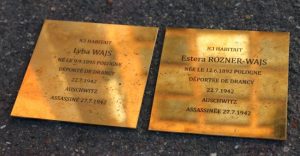 Fontenay-sous-Bois, the first French city to pave its streets in the name of all its deportees.
Fontenay-sous-Bois, the first French city to pave its streets in the name of all its deportees.
Inspired by what is done in Germany, Fontenay-sous-Bois will become the first Frenchcity to pay tribute to all its deportees with paving stones of memory. They will be placed in front of the homes of Jews or arrested resistance fighters.
In a street in Fontenay-sous-Bois, in the Paris suburbs, passers-by have their eyes fixed on the ground. In front of 45 rue Saint-Germain, a golden reflection on the sidewalk disturbs their walk. Some continue on their way, while others take the time to stop. On the other side of the street, in his butchery, Sofiane realized this funny agitation: “There are even people who sometimes take pictures”.
The young man apologizes. He himself did not have the curiosity to read what is inscribed a few meters from his shop on two brass plates: “Here lived Lyba Wajs, deported from Drancy 22.7.1942 Auschwitz, murdered 27.7.1942 “. In the cafe next door, the bartender Amandio also discovers these inscriptions: “I had not noticed them until now, I had not heard about it”.
“Bring the story out of books”
These plates were however asked last April on the occasion of the national day of the deportation in homage to two inhabitants of this city of Val-de-Marne disappeared in the death camps. The couple Wajs, Jews from Poland, had been arrested during the Vél d’Hiv roundup. In all, seven plaques were placed in front of the home of Fontenaysiens deported during the Second World War.
This operation is the initiative of Loïc Damiani, deputy mayor and delegate for historical heritage. It was during a trip to Germany that he had this idea. He was inspired by the Stolpersteine (obstacle or stumbling block in German) posed since 1993 by the Berlin artist Gunter Demnig to honor the memory of the victims of Nazism. “This marks the trace of the inhabitants where they lived,” said this historian and son of deported. “It makes it possible to mark the public space, to bring out the history of the books and to put it in concrete”.
“A past that goes wrong”
 While all over Europe, more than 61,000 Stolpersteine have been placed in more than 1,200 sites, in France, this type of initiative is still rare. Pavers of memory exist only in some cities of Vendée, Charente-Maritime and Gironde. Some municipalities are even hostile to this idea. In 2011, in La Baule-Escoublac, the city council refused such an installation in accordance with the principle of secularism, even though there is no religious motive on these pavements. “It is a past that goes wrong.The police and the French gendarmerie have largely arrested the Jews and the resistant.It is not very glorious,” said Loic Damiani.
While all over Europe, more than 61,000 Stolpersteine have been placed in more than 1,200 sites, in France, this type of initiative is still rare. Pavers of memory exist only in some cities of Vendée, Charente-Maritime and Gironde. Some municipalities are even hostile to this idea. In 2011, in La Baule-Escoublac, the city council refused such an installation in accordance with the principle of secularism, even though there is no religious motive on these pavements. “It is a past that goes wrong.The police and the French gendarmerie have largely arrested the Jews and the resistant.It is not very glorious,” said Loic Damiani.
In the population, the first reactions are rather positive. “I had already seen some in Germany, I was taken aback, I found it very good to see it here, it’s important to remember”, says Véronique, a resident of Fontenay-sous-Bois who passes every day in front of the Wajs husband plate. “Most residents are happy, there is just one lady who said she thought it was morbid,” said Loic Damiani. “It can be shocking indeed, but the idea is to show first and foremost their lives, that they are people who have lived, loved and belonged to the community.”
And to better disseminate this memory, Fontenay-sous-Bois has decided to see things big. It will become the first municipality to lay pavements for all victims: “We decided to do it for all the deported Fontenaysiens whether they died in the camps or they survived, and not just for two or three here and there, it should be 150 people. ”
This work will be done gradually over the next few years. The seven plates laid temporarily on the sidewalks will be replaced next year by real pavers buried in the ground. German artist Gunter Demnig will be present for the occasion. For Loic Damiani, the memory of the deported people of Fontenay-sous-Bois will thus be firmly rooted in the city: “The idea of the Nazis was to make them disappear completely, we give them a name, a house, an address. life”.
Sources : France24
